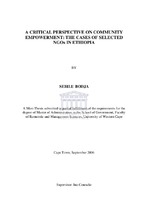| dc.contributor.advisor | Conradie, Ina | |
| dc.contributor.author | Sebilu Bodja | |
| dc.contributor.other | School of Government | |
| dc.contributor.other | Faculty of Economics and Management Sciences | |
| dc.date.accessioned | 2013-08-20T13:05:56Z | |
| dc.date.available | 2007/06/15 15:26 | |
| dc.date.available | 2007/06/15 | |
| dc.date.available | 2013-08-20T13:05:56Z | |
| dc.date.issued | 2006 | |
| dc.identifier.uri | http://hdl.handle.net/11394/1978 | |
| dc.description | Masters in Public Administration - MPA | en_US |
| dc.description.abstract | Empowerment is a catchword that has recently entered current development debate. Development is largely perceived as a process of building capacities hence empowering people to be able to handle their affairs. As such it is a concept highly espoused by prominent development actors and mainly Non-governmental organizations (NGOs). The study attempted to examine the theoretical and empirical aspects of community empowerment from a critical perspective by surveying activities of three NGOs in Ethiopia. A recent framework developed by a working group of the World Bank for measuring and structuring analysis was used for analyzing findings. Conceptualization and practices of empowerment seem to be at a nascent stage and tools for measuring it as well; that is what the findings of the study indicate. Despite the rhetoric surrounding the concept, the experience of surveyed NGOs also shows disparities between theory and practice. | en_US |
| dc.language.iso | en | en_US |
| dc.publisher | University of the Western Cape | en_US |
| dc.subject | Community Empowerment | en_US |
| dc.subject | Civil Society | en_US |
| dc.subject | Non-Governmental Organizations | en_US |
| dc.title | A critical perspective on community empowerment: the cases of selected NGOs in Ethiopia | en_US |
| dc.type | Thesis | en_US |
| dc.rights.holder | University of the Western Cape | en_US |
| dc.description.country | South Africa | |

